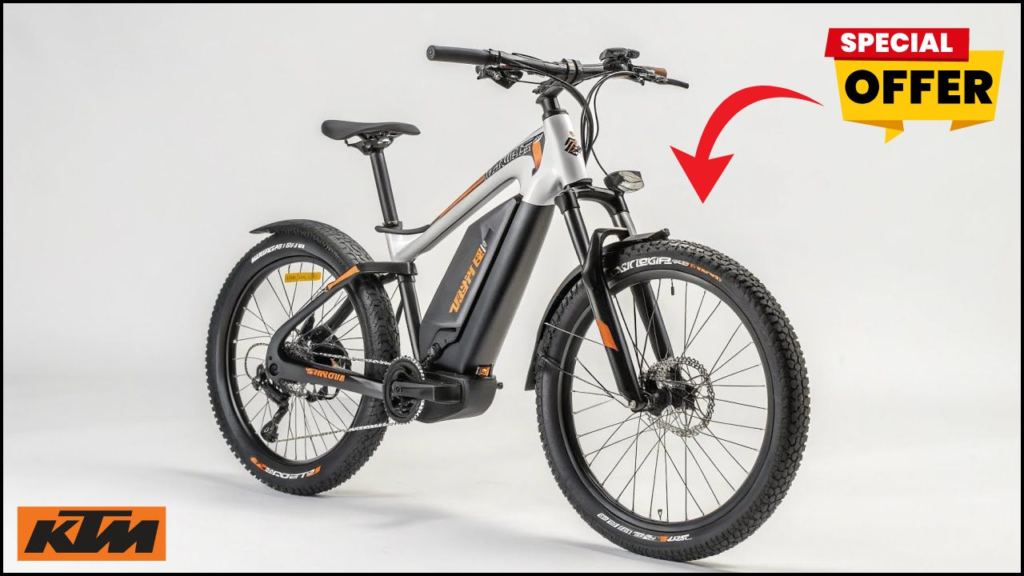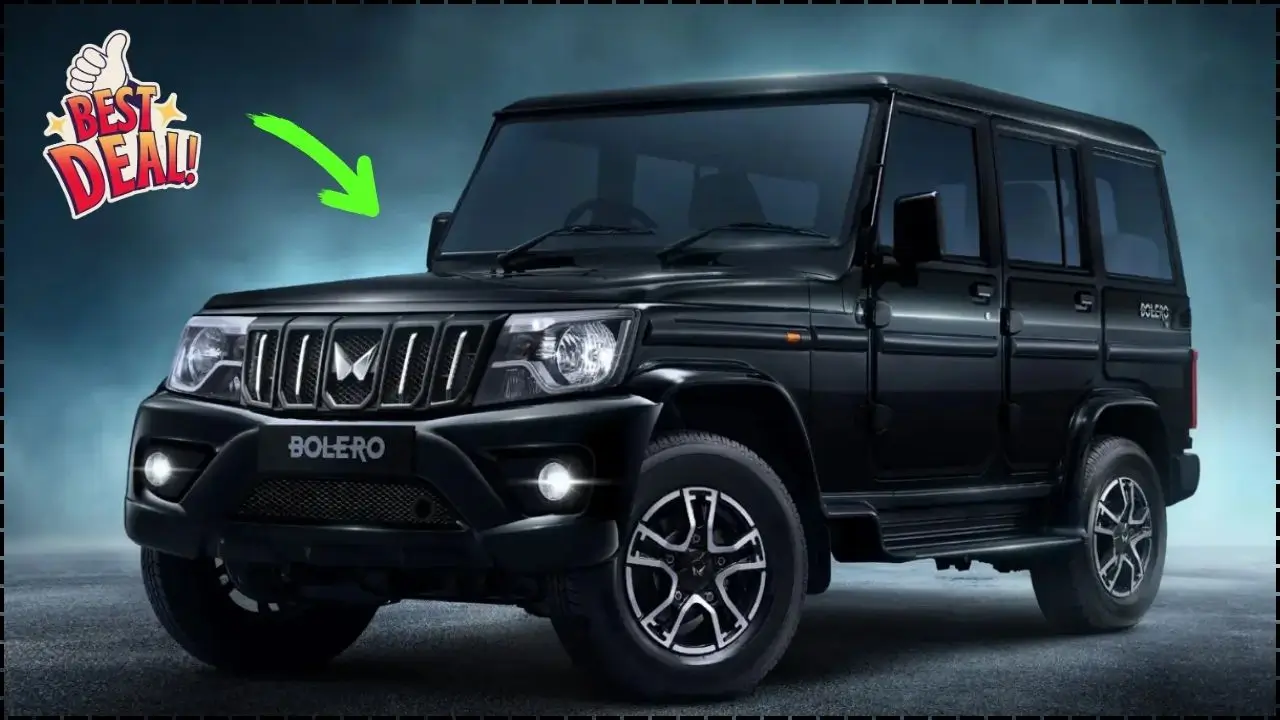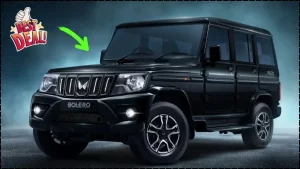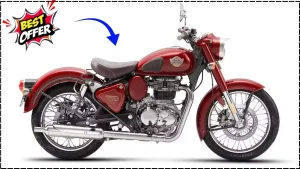
Viral social media posts and discount websites claiming to sell the KTM Electric Cycle 2025 for ₹2,599 have prompted investigations by Indian consumer protection agencies. The extraordinarily low price has raised serious concerns over online scams, misleading advertising, and consumer safety in the rapidly expanding e-bike market.
Table of Contents
Unrealistic Pricing Raises Red Flags
Over the past week, several websites and social media ads have claimed that consumers can purchase the KTM Electric Cycle 2025 at a “special price” of ₹2,599. Most of these advertisements carry attention-grabbing phrases such as “Limited Stock,” “Hurry, Offer Ends Today,” and “Official KTM Launch Discount.”
Experts say these tactics are characteristic of online fraud campaigns. “A high-quality electric bicycle involves expensive components, including lithium-ion batteries and motors. It is simply not possible to sell such a product at this price unless it is a scam,” said Dr. Arvind Mehta, Senior Fellow at the Indian Institute of Transport Studies.
A spokesperson for KTM India clarified that no such offer exists. “KTM has not launched any electric cycle in India at ₹2,599. We strongly urge customers to check only our official website or visit authorized KTM dealerships,” the spokesperson said.
The Actual Market Price of Electric Cycles in India
Electric cycles are becoming increasingly popular among Indian consumers, particularly in urban centres. These vehicles offer an eco-friendly and affordable alternative to petrol-powered scooters and motorcycles. According to data from the Society of Manufacturers of Electric Vehicles (SMEV), the average cost of a reliable electric cycle in India in 2025 ranges from ₹20,000 to ₹80,000.
Low-cost models typically use smaller motors and have limited range, while premium variants offer larger batteries, improved build quality, and advanced safety features. KTM’s existing electric two-wheeler models fall within the mid-to-premium bracket, making the claimed ₹2,599 price especially unrealistic.
How Scam Websites Operate
Fake Discounts and Countdown Timers
Many of the websites advertising this supposed offer display countdown timers and messages suggesting the deal is about to expire. Cybersecurity experts note that these strategies are designed to pressure users into making impulsive purchases without proper verification.
“These fake platforms use urgency and emotional triggers to lower people’s guard,” said Anita George, Head of Cybercrime Awareness at the Data Security Council of India. “They often disappear after collecting payments.”
Phishing and Data Harvesting
In addition to financial loss, buyers risk exposing personal data. Fraudulent sites often ask for full contact details, Aadhaar or PAN numbers, and advance payments through insecure gateways. This data can later be sold or used in identity theft.
Consumer Protection Agencies Respond
The Ministry of Road Transport and Highways (MoRTH) confirmed that it is working with the Department of Consumer Affairs (DoCA) and cybercrime units to trace the origin of these fraudulent advertisements. “We are taking these scams very seriously. Cybercrime divisions are investigating the platforms behind these offers,” a senior MoRTH official said.
KTM India has also initiated legal steps to protect its brand reputation. The company has issued a public advisory urging buyers to avoid unverified third-party sites and report suspicious offers to authorities.
Legal and Safety Implications for Buyers
Buying uncertified or counterfeit electric vehicles can have legal consequences. Many of these products do not meet the Central Motor Vehicles Rules (CMVR) and lack Bureau of Indian Standards (BIS) certification. Using such vehicles on public roads may be illegal and unsafe.
“Counterfeit electric cycles often use low-quality batteries that can overheat or catch fire,” explained Dr. Neha Bansal, a transport safety expert at the National Automotive Testing and R&D Infrastructure Project (NATRiP). “These products also lack after-sales service, spare parts, and warranties.”
Rising Popularity of E-Bikes in India
Electric mobility is witnessing rapid growth in India. According to SMEV, over 1.2 million electric two-wheelers were sold in 2024, with a significant share coming from e-cycles and lightweight e-bikes. Growing fuel costs, government incentives, and environmental awareness are driving this demand.
This popularity has also created opportunities for fraudulent sellers to target inexperienced buyers. “Many first-time buyers don’t know what a fair price range looks like, which makes them vulnerable to scams,” said Ritu Singh from the Department of Consumer Affairs.
How to Verify Genuine Offers on KTM E-Cycle 2025
Official Channels and Certifications
Authorities recommend that consumers purchase electric vehicles only through verified dealerships or recognized online platforms. Key checks include:
- Ensuring the seller has a valid GST number and registered business address.
- Verifying that the product carries BIS certification.
- Confirming the price range with official brand websites.
- Avoiding websites that offer large discounts without clear terms.
- Using secure payment methods and avoiding full upfront payments.
Reporting Fraud
Consumers who suspect a scam are encouraged to file complaints through the National Cyber Crime Reporting Portal (cybercrime.gov.in) or contact local police. Many of these fraudulent sites operate under multiple domain names, making reporting an essential step in taking them down.
Government and Industry Measures
The Indian government is developing stronger frameworks to regulate online marketplaces, including mandatory KYC for sellers and digital trust labels for verified e-commerce platforms. MoRTH and DoCA are also working with payment gateways to identify and block suspicious transactions linked to scam websites.
Meanwhile, e-bike manufacturers like KTM, Hero, and EMotorad are ramping up awareness campaigns to educate buyers. KTM India has published an advisory prominently on its website, warning against offers that do not originate from authorized dealers.
Social Media’s Role
Social media platforms have played a major role in spreading the ₹2,599 KTM Electric Cycle 2025 claim. The ads often appear as sponsored posts on Facebook, Instagram, and short-video platforms, sometimes with fake celebrity endorsements.
While the platforms have content moderation policies, fake ads often slip through. “We are flagging and removing misleading advertisements as they are reported,” a spokesperson for one major platform said.
TVS XL 125cc Bike at ₹49,999: Special Launch Offer for Budget Buyers
Conclusion
The claims surrounding the KTM Electric Cycle 2025 highlight both the growing interest in electric mobility and the risks posed by unregulated online marketplaces. As e-bike adoption rises, experts stress the need for greater buyer awareness, stronger consumer protection mechanisms, and responsible platform governance.
Authorities urge consumers to remain vigilant, verify the authenticity of offers, and purchase only from trusted sources. A deal that seems too good to be true usually is.















